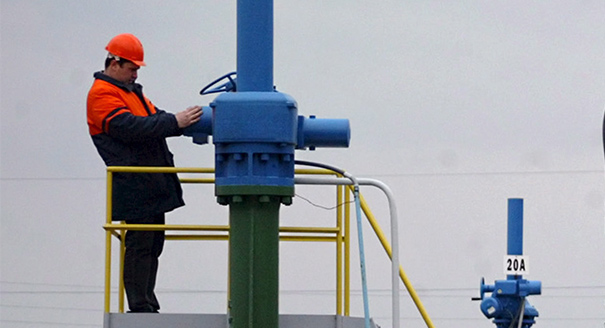The long-running on-off saga of integration between Minsk and Moscow has ground to a halt after the two sides failed to reach even a symbolic agreement during their latest talks in December. Instead, they have entered into a conflict over energy prices that could put an end to their plans for integration altogether.
It was clear from the very beginning that meaningful integration of the two countries—which Russia has made a condition of Belarus retaining the oil and gas concessions it currently receives—could not be achieved without shared institutions. But throughout the last year, both sides acted as though they could boost their integration without creating the institutional framework required for that to work. Then, at the end of 2019, President Vladimir Putin and then prime minister Dmitry Medvedev announced that integration would not be complete without the establishment of supranational bodies and a single currency.
Supranational bodies and a single currency are in theory acceptable to Minsk, but only if Belarus has an equal voice to Russia’s within them. It’s hard to imagine Russia, by far the bigger partner, agreeing to that.
As the new year approached, Minsk and Moscow had no new contract for oil supplies, and no agreement on gas prices. The gas issue was temporarily solved by an agreement to extend the current price for another two months.
Then Russian oil stopped reaching Belarusian refineries through the Druzhba pipeline on January 1, the two sides having fallen out over pricing. Russian oil is getting more expensive for Belarus as a result of Russia’s so-called tax maneuver: Russia is gradually ending export duties on its crude oil while increasing its mineral extraction tax, meaning Belarus will have to buy it at world prices and can no longer fill its coffers by reselling it at a higher price. Belarus, a member of the Russia-led Eurasian Economic Union, wants Russia to compensate its oil refineries for the losses incurred, and to sell Belarus gas at Russian domestic prices.
Minsk believes that for years, it has been given the go-around over the issue of oil. From the Belarusian viewpoint, Moscow first made the oil market separate from the Eurasian Economic Union, having promised to supply crude product tax-free to Belarusian refineries.
Then it not only voided those benefits through its tax maneuver; it also started attaching political conditions to compensation for those losses.
On top of everything else, Minsk is losing nearly half a billion dollars from the cancelation of the customs scheme. In 2017, Minsk accepted a gas price that it considered inflated in exchange for Moscow agreeing to supply Belarus with 6 million tons of tax-free oil, which Belarus could then slap customs tariffs on and resell at global prices. This scheme also ended with the gas contract on December 31.
Refusing to buy oil on Russia’s terms—at a premium of $10 per ton—is a matter of principle for Lukashenko. Only companies belonging to Mikhail Gutseriev, a friend of Lukashenko’s, agreed to deliver oil without receiving the premium. Their supply volume is several times lower than what Belarusian refineries had planned to process in January. They are effectively doing just enough to keep the country supplied with gasoline.
With neither side prepared to back down, Lukashenko announced a radical solution at an emergency meeting with Belarusian oil processing companies on December 31: if Russia won’t agree to our terms, we will look for oil elsewhere. Minsk has since bought 80,000 tons of Norwegian oil.
Specialists argue that Russian oil may be getting more expensive, but until 2024 will still be cheaper than global market prices for crude. Plus, a pipeline is the cheapest method of delivery: according to Reuters, Minsk will have to pay an extra $20 per ton of Norwegian oil just for its delivery via the Lithuanian port of Klaipeda.
With no other immediate options on the table, Lukashenko conceded on January 21 that it would not be possible to do without Russian oil altogether, and gave a new order: to reduce its volume in Belarusian imports to 30–40 percent, even if that means buying oil at higher prices elsewhere.
Resolving to become less dependent on Russian oil has nothing to do with the Belarusian economy. Minsk is making a political statement with the aim of depriving Moscow of one of its main bargaining chips in their relationship. It’s not yet clear how long Lukashenko will be able to maintain this position, especially in a year when he is up for reelection.
And so dialogue over integration has ground to a halt on both sides. In Russia, Putin is seeking to change the constitution to facilitate the stable transition of power, proving wrong those who had posited he would remain in power after his current term expires in 2024 by heading a newly created unified state with Belarus. This doesn’t mean that Moscow is losing interest in integration altogether, but it does mean that enthusiasm for the idea will be tempered.
Meanwhile, for the Belarusian authorities, the only incentive for going along with closer integration was and remains tied to specific oil and gas concessions. Without this, why should Lukashenko be interested in integration at all?
The relationship could change again if the conflict with Russia damages the Belarusian economy so badly that it becomes a threat to the country’s political stability. If that happens, Lukashenko may change his position—but not necessarily in favor of integration. He could portray his country as a “besieged fortress” from the east.
Moscow might soften its stance on Belarus if it perceives that the gulf between the two neighbors is getting too wide. But it could also escalate and get even tougher with its quixotic western neighbor.
